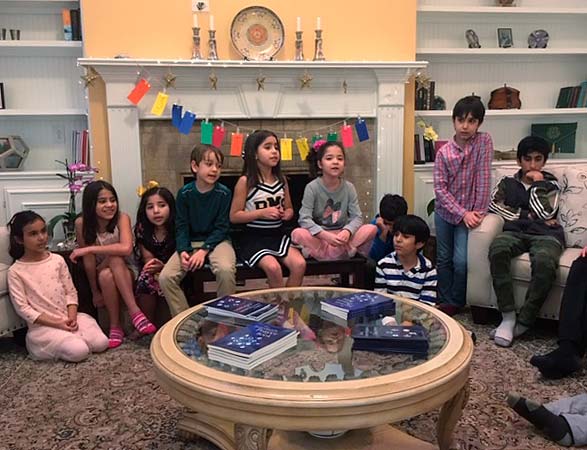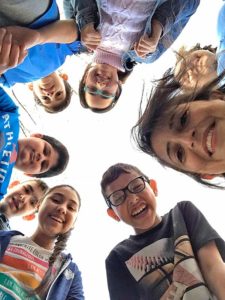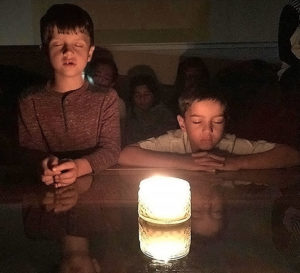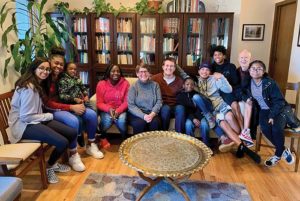



The community is serving more and more as that environment in which individual effort and collective action, mediated by the institute, can complement each other in order to achieve progress. The vibrancy it manifests and the unity of purpose that animates its endeavours are drawing into its swelling ranks those from every walk of life eager to dedicate their time and energies to the welfare of humanity.
In relationships among the friends, then, this development in culture finds expression in the quality of their interactions. … So it is that their thoughts are centred at all times on helping one another scale the heights of service to His Cause and soar in the heaven of His knowledge. This is what we see in the present pattern of activity unfolding across the globe, propagated by young and old, by veteran and newly enrolled, working side by side.
—Universal House of Justice, from messages in 2008 and 2010
As Baha’is and friends drink more deeply from the cup of service through community building, bonds of love between them and with those who engage in the activities they initiate strengthen before their eyes. Not surprisingly, that draws more and more people into the process.


“No matter which core activity you are involved in, you often see results or know you are planting seeds for the future. You also get to know the other active members of your community much more intimately, which leads to a deeper sense of community unity,” says Melanie Danch-Powell, a Baha’i in Roswell, Georgia.
“More deep friendships have developed and the community has become more enthusiastic as more possibilities open up before us,” she says. “I see that those community members who are active become much more willing to help each other in myriad ways — not out of a sense of duty but out of a sense of friendship, whether it’s something as simple as helping with transportation or subbing for each other in our core activities when needed.”
May Akhtarkhavari and Leyla Pakzad see this spirit playing out daily in activities in the Champions Green neighborhood of Roswell.
For Ayyam-i-Ha, an annual time of hospitality and service, “We invited all the parents of the junior youths and children and had a devotional that the children and junior youths prepared,” recalls Akhtarkhavari. “As a result of the event one of the mothers volunteered to host the junior youth group.
“My husband, Na’im Ru, a few weeks ago started a Ruhi Book 1, Reflections on the Life of the Spirit, study circle at the same place we are doing the children’s class. Now the host of our children’s class is attending consistently the Book 1.”
Pakzad began animating the Champions Green junior youth group six months ago and it grew to the point a second group had to launch.
“This way we have more room to do activities,” she says. And “as each group is getting more mature and learning the concepts of service, we are able to get some of their neighbor friends involved as well, which is so wonderful.”
A natural progression of participation
Similar echoes of ever-expanding participation are being heard in the Sacramento, California, area, where Naseem Arfai says “a vibrant, self-sustaining junior youth program” has emerged in the Florin neighborhood.
“These activities, filled with a spirit of devotion, singing, and boundless energy, have catapulted the progress of this sustained effort of Baha’i-inspired community development,” says Arfai.
“Several original participants of the junior youth groups now lead the same efforts, have recognized Baha’u’llah and become dedicated followers of the Cause as a natural progression of their participation. They regularly offer testimony that these programs served to reorient and give meaning to the direction of their lives.”


In nearby Elk Grove, California, members of the Spiritual Assembly, the local Baha’i governing council, and its appointed committees reflected on “what it means to build a vibrant community,” says Kedi Eshetu-Davidson, and concluded that “consistent and deliberate action to include the wider community was essential.”
Eshetu-Davidson sees activities such as these helping to solidify the foundation for a truly inclusive community:
As those activities gain momentum, Baha’is and friends have established an additional children’s class in another town; are engaging in service alongside members of a Methodist congregation; are supporting youths working with a junior youth group; and have formed a choir.
An indelible impact that radiates outward
To Baha’is in Louisville, Kentucky, it’s becoming abundantly clear what happens when more and more neighbors join in activities.
Cynthia Christensen, an Auxiliary Board member who advises Baha’i communities across the state, tells of a devotional gathering in Louisville that through “patience and steadfastness” has swelled to nearly 25 regular attendees and has an indelible impact that continues to radiate outward.
“One couple that declared their belief in Baha’u’llah began studying the courses of the Ruhi program and are currently involved in the study of Ruhi Book 3, Teaching Children’s Classes, Grade 1, preparing to serve as children’s class teachers,” relates Christensen.
“Their love for the Faith was apparent early on as their children began attending Sunday morning children’s classes at the Baha’i Center even before the parents enrolled in the Faith. Two additional devotionals have branched from this great effort, and two more are on the horizon.”
Jacque Jenkins and Judy Parsley add that the community’s response to changing demographics has contributed to its vitality.
As a result of outreach to high school students, a youth who expressed interest in mentoring younger children joined with Nepali immigrant youths to attend an institute training camp over winter break, relates Jenkins. “They all came back ready to continue the children’s class as well as starting a junior youth group.”
Parsley points to an influx of families with children after years of struggling to keep children’s classes going. “The need to provide for the children and to free their parents up to serve became evident,” she says.
A committee to provide programming for children at Feasts was formed, an education committee was set up to ensure the continuity and quality of children’s classes, and community members were recruited to assist with classes on a rotating basis.
An expanding consciousness
Parents started core activities in Westerville, Ohio, out of a “maternal desire to raise our children in the Faith,” says Jennifer Botte. Children’s classes and devotional gatherings spawned an annual Children’s Unity Day in a park, which draws children and their parents. Many of those have been invited to attend children’s classes.
“As our children are growing older we are helping to turn their energy into action by arranging multiple service opportunities (sorting food at the pantry, arts and crafts at the rehab center, etc.),” says Botte. “This has been another great opportunity to include our friends and community.”
And this expanded consciousness continues to express itself in unexpected ways, she says. “Since our community has put so much energy into children’s activities we also have changed how we approach Feast,” the Baha’i gathering every 19 days for worship, planning and fellowship.
They’ve incorporated “shorter readings [of sacred writings] so that we can invite children to read” and the “use of YouTube videos with songs to make it a multimedia experience and break up the readings. This has increased community participation at all age levels.”
Carmel Avegnon-Sanders, another Baha’i in Westerville, tells of another initiative. When a high school student “was insulted because of his racial background, my friend called me [and was] very upset. And after hearing her pain I reached out to a few of my Baha’i mom friends and shared the story.”
They ended up starting a devotional gathering where “moms could come together and pray for love, unity and acceptance,” she recalls.
Avegnon-Sanders also has created a Baha’i-inspired theater troupe that helps young people ages 12 to 18 “be the change they wish to see in the world by engaging in acting, movement, music and storytelling workshops. … We bring together a diverse group of young people to celebrate our differences.”
Assembly focuses on unity and inclusion
Thoughtfully laying the groundwork for current activities has enabled Baha’is in Westminster, Colorado, to be on firm footing, says Cheryl Ann Chamberlain.
“In 2008 the Local Spiritual Assembly recognized the need to focus on the unity of the community,” Chamberlain recalls. “Ongoing efforts have included home-visit campaigns, focused prayer at Assembly meetings, Feast consultation topics shared with the community beforehand, and encouragement of individual initiative.
“A member new to the community observed, ‘Prior to our moving here in 2012, the Assembly’s wholehearted focus on unity was so marked that when we came it was obvious.’”
Chamberlain says the Assembly sends frequent “love letters” to the community “appreciating all their service and asking for their prayers. These also provide an avenue to update the community on Assembly areas of focus.”
“With inclusivity in mind,” she says, “we’ve scheduled our Feasts to facilitate the participation of the entire community. We realize that everyone cannot do everything, but feel strongly that everyone be encouraged to do something. This is reflected in a high level of participation in the Fund, an opportunity open to all Baha’is.”
Ongoing consultation was key to solving a budding crisis when the prospect of maintaining a children’s class in town while helping to support a children’s class and junior youth group in nearby Federal Heights began “taking the energies of animators and teachers,” says Chamberlain.
“Parents and children of the Westminster class met to consult,” she says, “and decided to join the Federal Heights weekly children’s class. In addition, the Westminster class continues to meet monthly.”


A new feeling of hope and empowerment
Meanwhile, in another Denver-area community, Aurora, Colorado, “There is a new feeling of hope, empowerment, creativity and inspiration arising from the increased participation and the deepening devotional character of the community,” says Charlotte Babcock.
Helpers from other communities “have come and gone, some core activities have not been sustained, others have dwindled,” she says. “However, it can clearly be noted that there has been progress, especially since this last July.”
The new hope coincides with an almost doubling of Feast attendance, says Babcock. “Many Baha’is have become active again largely due to the devotional gatherings to which they have been lovingly invited and through which they have forged a deeper connection to Baha’u’llah and have developed friendships connecting them to the Aurora Baha’i community.
“Another contributing factor in increased Feast attendance has been the Assembly’s response to community concern to find a way to accommodate the Persian-speaking believers to be able to more actively participate in Feast consultation,” she explains.
“This has fostered greater inclusiveness and joy in the Feasts as well as greater unity as needs are met and intercultural friendships have developed.”
A systematic campaign of visits to Baha’i households also is seen as a factor in increasing the number of Baha’is engaged in community building.
“Since the campaign began at the end of this January, we have gained two new study circles with a third to start soon,” says Babcock. “A new children’s class will begin within two weeks. Plus, two people who have been attending events in other communities are now on committees for two of Aurora’s Holy Day celebrations.”


![]()
![]()
Whether you are exploring the Bahá'í Faith or looking to become an active member, there are various ways you can connect with our community.
Please ensure that all the Required Fields* are completed before submitting.